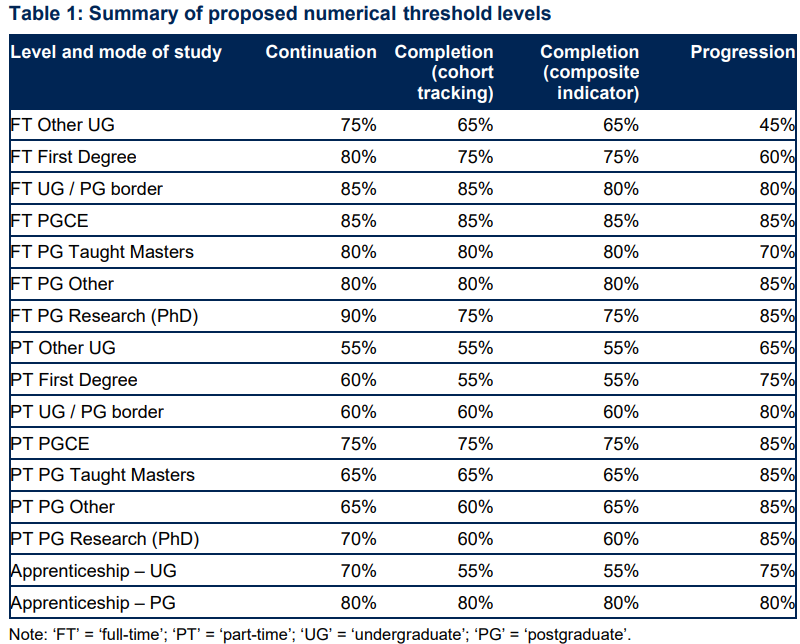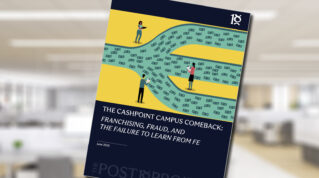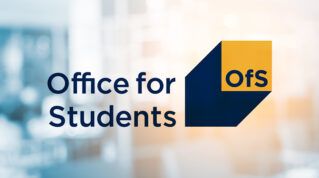Colleges and universities are being set tougher outcome measures by the higher education regulator – with plans for “intrusive sanctions” like fines and funding restrictions on those who fail to meet targets.
In a consultation launched today, the Office for Students said it wants to use numerical thresholds for student outcomes (see table below). These thresholds will be set around students’ continuation, completion and progression of courses, including degree apprenticeships.
The thresholds are designed to target poor-quality courses and outcomes which are “letting students down”.
One consequence of the measures, as acknowledged by the OfS, is that universities and colleges might withdraw from partnership arrangements and be “disincentivised” to enter them in the future.
“These proposals mark a landmark moment in our work to tackle poor quality provision in English higher education,” said Nicola Dandridge, chief executive of the OfS.
“Students from all backgrounds deserve to be on good courses leading to qualifications which stand the test of time and prepare them well for life after graduation.”
Dandridge said that universities and colleges in England run high quality courses that deliver positive outcomes for students.
“The thresholds that we have proposed will not affect them. They are instead designed to target those poor-quality courses and outcomes which are letting students down and don’t reflect students’ ambition and effort,” she said.
The OfS is proposing to amend condition B3 of its regulatory framework to include the use of the new numerical thresholds.
These thresholds will be for full and part-time students at both undergraduate and postgraduate level. They will also be used for apprenticeships.
According to the OfS, they have been designed to set a “high bar” which takes account of a university or college’s individual circumstances.
The OfS said it will use its regulatory judgement to set numerical thresholds that represent the point at which they would consider intervening to ensure providers are delivering positive outcomes for each indicator.
In its consultation the OfS gave an example of what these thresholds might look like:

Consequences of not meeting requirements
The OfS said that universities and colleges who do not meet the thresholds – which will underpin requirements for minimum acceptable student outcomes – could face investigation, with fines and restrictions on their access to student loan funding available as potential sanctions.
These proposals will sit alongside the OfS’s other conditions of registration on quality in higher education.
“Alongside the thresholds, we are providing detailed information to universities and colleges that will enable them to assess their own performance, and to make improvements where quality is low – whether that is across the board, or for particular groups of students, or in certain subjects,” said Dandridge.
“But we are clear that we are raising our expectations of universities and colleges. Low quality courses which lead to poor outcomes for students are unacceptable, and we are determined to take action where students are recruited onto courses which offer few tangible benefits,” she added.
Partnership arrangements
The OfS admitted that the proposed measures could lead to some providers withdrawing from partnership arrangements rather improving outcomes for the students involved.
“If partnership arrangements that do not deliver positive outcomes for students are terminated, we do not consider that to be adversely limiting student choice,” the OfS said in its consultation.
“It is, however, also possible that some providers may withdraw or decide not to enter new partnerships because of increased regulatory scrutiny, regardless of the quality of the courses delivered and the outcomes achieved.”
The OfS said it did not expect a provider to “churn” courses or partnerships to avoid regulatory attention.
“If there is evidence that a provider is withdrawing from partnerships to do this, we may undertake further investigation to confirm that its management and governance arrangements for its partnerships are robust and effective and that decisions to work with other organisations are the result of a strategic approach rather than opportunism,” the regulator said.
It added that outcomes of such an investigation could “raise concerns” about a provider’s suitability to hold degree awarding powers that can be used in partnership arrangements.

















Your thoughts